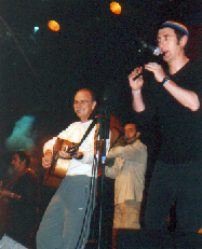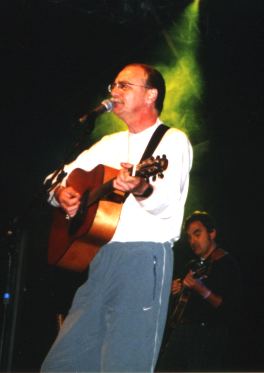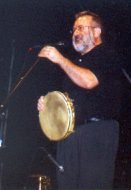FolkWorld article by Michael
Moll:
Ambassadors of the Basque langauge
Oskorri - 30 years and still going strong
 Due
to main stream media most people associate the Basque Country with terrorism
and violent regionalism. Little is known about the beauty of this region in
the French/Spanish Pyrenees edging towards the Atlantic, and little is also
known about the wealth of regional culture and tradition and about the Basque
language, one of the oldest languages in the world. The band Oskorri has been
an ambassador for folk music traditions from the Basque country for 30 years
now, and still today their live appearances and CDs are innovative, fresh and
recommended. Michael Moll found out more when meeting the band at the Falun
Folk Festival in Sweden.
Due
to main stream media most people associate the Basque Country with terrorism
and violent regionalism. Little is known about the beauty of this region in
the French/Spanish Pyrenees edging towards the Atlantic, and little is also
known about the wealth of regional culture and tradition and about the Basque
language, one of the oldest languages in the world. The band Oskorri has been
an ambassador for folk music traditions from the Basque country for 30 years
now, and still today their live appearances and CDs are innovative, fresh and
recommended. Michael Moll found out more when meeting the band at the Falun
Folk Festival in Sweden.
As Bixente Martinez, string instrumentalist of Oskorri, says, already right
from the start the most important aspect of Oskorri was to sing in the Basque
language. Basque is a very old language, and unlike most European languages,
it has no connections with Latin. Bill Bryson, American travel author living
in England, summarises in his (highly recommended) book "Mother Tongue" about
the Basque, "Europe's oldest and most mysterious ethnic group":
"Their language, called Euskara by its speakers, may be the last surviving
remnant of the Neolithic languages spoken in Stone Age Europe and later displaced
by Indo-European tongues. No one can say. What is certain is that Basque was
already old by the time the Celts came to the region. Today it is the native
tongue of about 600,000 people in Spain and 100,000 in France in an area around
the Bay of Biscay stretching roughly from Bilbao to Bayonne and inland over
the Pyrenees to Pamplona. Its remoteness from Indo-European is indicated by
its words for the numbers one to five: bat, bi, hirur, laur, bortz. There is
simply no proven connection between Basque and any other known language."
(Bill Bryson, Mother Tongue, P. 13/14)
When Oskorri started in 1971, it was the time of Franco's dictatorship, when
it was forbidden to sing in Basque. The band wanted to keep this old language
with their music alive, this was actually the reason to start. As Bixente explains,
"the movement of speaking Basque again and making the language interesting for
a modern society was a street movement in the cities, it was not a rural movement".
Oskorri also have this urban background, coming from the big industrial places
on the coast. None of the members has been brought up in a traditional rural
environment. This is also the reson why Oskorri did not start as a purely traditional
band.
 In
the beginning Oskorri were playing mainly rock music. "We then became aware
that this was not our thing; we were not really moved by it. We like rock, but
we felt just like copying American and English musicians - it is not our own
thing. As a result, we started to think: What is our tradition, our music background?
We began looking into books and listening to old records, and little by little
we got more into traditional music, and started playing ancient instruments."
In
the beginning Oskorri were playing mainly rock music. "We then became aware
that this was not our thing; we were not really moved by it. We like rock, but
we felt just like copying American and English musicians - it is not our own
thing. As a result, we started to think: What is our tradition, our music background?
We began looking into books and listening to old records, and little by little
we got more into traditional music, and started playing ancient instruments."
Oskorri started to rediscover long forgotten traditional music, verses and songs,
as well as using more and more traditional instruments. They arranged traditional
music in a more modern way: "Right from the beginning we were trying to mix
old instruments with modern instruments, to create traditional music but in
a new way."
Most of the material they dicovered in old books and records, along to a bit
of field work. "There are still quite a lot of people in little villages and
at the farms in the mountains preserving old tunes, old songs, old traditions.
Yet with the Spanish Civil War in the 1950s, there was a very strong cut to
the traditions. During that time, a lot of traditions were banned by the dictatorship."
A lot of material has though slipped into books before, and Oskorri "are trying
picking it from the books to bring these old songs to life again, to get them
back into the streets."
Oskorri is today without doubt the most important folk music act from the
Basque Country, and they have influenced the Basque music scene a lot in the
last 30 years. In these thirty years a lot of young people started to play traditional
music in a new way. Today Basque folk music is flourishing again, more and more
young people play traditional music. This revival started with Franco's death,
with the end of the dictatorship in the Seventies: "Everybody wanted to get
involved with the old traditions, to revive them again. And right now there
is still a very big moment of traditional music; there are a lots of accordion
players, singers etc. Well we are old now, but there are a lot of young people
who keep up the music traditions." The new revival is centred around the Basque
accordion player Kepa Junkera, one of the most amazing and exciting accordion
player alive. He has evolved his very own distinctive style of playing on the
old Basque accordion, the trikitixa, a style based on the Basque traditions,
yet having a very driving new flair. A lot of young players are now taking up
the trikitixa, and using also this very style.
I ask Bixente if there is in his opinion a link between traditional music
and the independence movement in the Basque country, without doubt a bit of
a critical question. He replies: "With this kind of questions we are getting
into politics. And for us as musicians, as players of traditional music, we
are not political, we are not very close to one movement. We think that traditional
music and Basque music is not part of one political movement or another, but
this music is of all the Basque people, and it is for everybody. We really don't
like mixing our work and our music with politics."
 Now
I am still wondering what is happening these days to Europe's oldest and most
mysterious language, Euskara. Is it on its way up again? "When democracy came
to Spain, we got our regional government and a degree of autonomy. Basque language
education returned to our schools, the Basque language was used on TV and radio
stations, and there were more and more books and records in Basque. today most
of the children know to speak Basque. And because of that a lot of parents go
to evening classes to learn it. We are still a very little language, but we
are not going down, we are going up."
Now
I am still wondering what is happening these days to Europe's oldest and most
mysterious language, Euskara. Is it on its way up again? "When democracy came
to Spain, we got our regional government and a degree of autonomy. Basque language
education returned to our schools, the Basque language was used on TV and radio
stations, and there were more and more books and records in Basque. today most
of the children know to speak Basque. And because of that a lot of parents go
to evening classes to learn it. We are still a very little language, but we
are not going down, we are going up."
Oskorri meanwhile are also not going down, but going up still, after having
been on the road for 30 years. Their live performances are extremely fresh and
lively; obviously the music and performance has evolved with the time. Oskorri's
line-up today is a mixture of founding members and younger Basque musicians,
all in all they are a seven-piece band featuring a mix of modern (electric and
acoustic guitars and bass, mandolin, sax, percussion) and traditional (violin,
flutes, alboka, txirula, bagpipes, percussion) instruments. Their most recent
album "Ura", is a real celebration of Basque music featuring plenty of well-known
and highly talented guests, succh as Kepa Junkera, Oreka Tx (of the Kepa Junkera
band), Glen Vélez, La Bottine Souriante's Michel Bordeleau and Ivo Pasasov.
A proof how much this old band is still very much alive and in the midst of
the best folk music performers.
Oskorri are doing a great job as ambassadors of their unique language and
traditions.
Latest published CD: Ura, reviewed
in FolkWorld No. 14
Related Internet sites: Band Homepage: www.oskorri.com;
Record Company Homepage: www.elkarlanean.com
Contact e-mail address: Kap Produkzioak, kap_prod@teleline.es
Photo Credit: All Photos by The Mollis
Back to the content of FolkWorld
Features
To the content of FolkWorld No. 21
© The Mollis - Editors
of FolkWorld; Published 2/2002
All material published in FolkWorld is © The
Author via FolkWorld. Storage for private use is allowed and welcome. Reviews
and extracts of up to 200 words may be freely quoted and reproduced, if source
and author are acknowledged. For any other reproduction please ask the Editors
for permission. Although any external links from FolkWorld are chosen with greatest care, FolkWorld and its editors do not take any responsibility for the content of the linked external websites.
FolkWorld - Home of European Music

Layout & Idea of FolkWorld © The Mollis - Editors of FolkWorld
 Due
to main stream media most people associate the Basque Country with terrorism
and violent regionalism. Little is known about the beauty of this region in
the French/Spanish Pyrenees edging towards the Atlantic, and little is also
known about the wealth of regional culture and tradition and about the Basque
language, one of the oldest languages in the world. The band Oskorri has been
an ambassador for folk music traditions from the Basque country for 30 years
now, and still today their live appearances and CDs are innovative, fresh and
recommended. Michael Moll found out more when meeting the band at the Falun
Folk Festival in Sweden.
Due
to main stream media most people associate the Basque Country with terrorism
and violent regionalism. Little is known about the beauty of this region in
the French/Spanish Pyrenees edging towards the Atlantic, and little is also
known about the wealth of regional culture and tradition and about the Basque
language, one of the oldest languages in the world. The band Oskorri has been
an ambassador for folk music traditions from the Basque country for 30 years
now, and still today their live appearances and CDs are innovative, fresh and
recommended. Michael Moll found out more when meeting the band at the Falun
Folk Festival in Sweden.  In
the beginning Oskorri were playing mainly rock music. "We then became aware
that this was not our thing; we were not really moved by it. We like rock, but
we felt just like copying American and English musicians - it is not our own
thing. As a result, we started to think: What is our tradition, our music background?
We began looking into books and listening to old records, and little by little
we got more into traditional music, and started playing ancient instruments."
In
the beginning Oskorri were playing mainly rock music. "We then became aware
that this was not our thing; we were not really moved by it. We like rock, but
we felt just like copying American and English musicians - it is not our own
thing. As a result, we started to think: What is our tradition, our music background?
We began looking into books and listening to old records, and little by little
we got more into traditional music, and started playing ancient instruments." Now
I am still wondering what is happening these days to Europe's oldest and most
mysterious language, Euskara. Is it on its way up again? "When democracy came
to Spain, we got our regional government and a degree of autonomy. Basque language
education returned to our schools, the Basque language was used on TV and radio
stations, and there were more and more books and records in Basque. today most
of the children know to speak Basque. And because of that a lot of parents go
to evening classes to learn it. We are still a very little language, but we
are not going down, we are going up."
Now
I am still wondering what is happening these days to Europe's oldest and most
mysterious language, Euskara. Is it on its way up again? "When democracy came
to Spain, we got our regional government and a degree of autonomy. Basque language
education returned to our schools, the Basque language was used on TV and radio
stations, and there were more and more books and records in Basque. today most
of the children know to speak Basque. And because of that a lot of parents go
to evening classes to learn it. We are still a very little language, but we
are not going down, we are going up."
